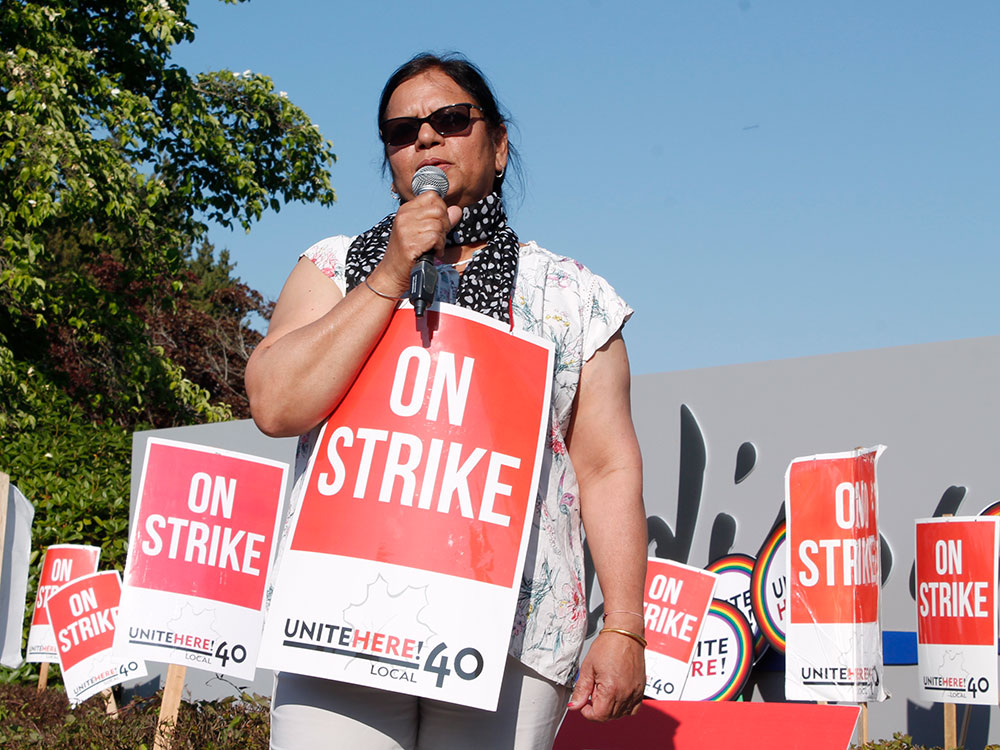Pardeep Thandi has spent nearly two decades working at the hotel at 3500 Cessna Dr. near Vancouver’s airport.
And she’s spent the last two years on the picket line outside it.
Thandi and dozens of her co-workers are now in a battle to get back their jobs at the former Pacific Gateway Hotel, where they have been on strike for more than 730 days, by far the longest hotel strike in the province’s history.
For a lot of her colleagues, many of them immigrant women, it’s the only place in Canada they’ve ever worked.
“When I retire,” Thandi said. “It will be from this hotel.”
The strike began in May 2021 after the hotel’s owners terminated 143 staff who had been laid off in 2021 and were hoping to return to their old jobs after the impact of the COVID-19 pandemic subsided.
But their contract only provided recall rights for one year and the employer chose to terminate them. It paid severance under the contract terms.
Their union, Unite Here Local 40, says the strike will continue until those workers get their jobs back.
Michelle Travis, a spokeswoman for the union, said they asked the PHI Hotel Group to extend the recall period for laid-off workers but it declined.
Travis says that company, which operates roughly a dozen properties across B.C., also tabled a proposal at the bargaining table that would have rolled back wages for many workers. The union’s last deal with the hotel expired in 2019.
“The employer wanted to gut the wages and the working conditions and wanted to move some of the jobs to minimum wage,” Travis said.
The PHI Hotel Group is owned by the RBI Group of Companies, whose president Sukhi Rai has interests in agriculture, construction and hotel management.
Rai said that he was allowed to terminate laid-off staff after one year under the terms of their last collective agreement with the union.
Rai also said he did not propose rolling back wages.
“That’s all false. There is a wage increase that we offered them,” Rai said. He said he chose to terminate staff instead of extending the recall in part because the company plans to phase out some food and beverage services at the hotel.
When it closed, the hotel was called the Pacific Gateway. Today, it's a Radisson Blu. It reopened last week with a skeleton staff, even though the picket line is still up. The 400-room hotel will operate with a staff comprised of managers and roughly 11 workers who have crossed Local 40’s picket line, Rai said. He said that plan would continue even if they lost money.
“If we need to operate at a loss, we’ll operate at a loss,” Rai said. “But I don’t think we will.”
Travis said she is doubtful the hotel will be successful.
“They don’t have the staff to effectively clean the rooms,” Travis said. “There is nobody to serve food. You can’t run an upscale hotel without experienced staff and they don’t have it.”
Travis said the parties have not met at the bargaining table since May 2021, when the strike began.
Since then, Richmond city council has voted to effectively boycott use of the hotel. So has the BC Federation of Labour, whose secretary-treasurer Hermender Singh Kailley appeared on the picket line to mark the two-year anniversary of the strike.
So did NDP MP Jenny Kwan, who criticized the hotel’s owners for their position, noting they had received substantial federal funding during the first months of the COVID-19 pandemic.
Starting in 2020, the federal government contracted 38 locations across Canada to be used as designated quarantine facilities for international travellers, including the hotel.
Tammy Jarbeau of Health Canada said $389 million had been spent renting out those properties since 2020.
Jarbeau declined to say how much was specifically given to the owners of the Cessna hotel, but said its contract ended in January.
Rai said he did not know how much money the government had given his hotel under that arrangement.
Kevin Woo, who worked at the front desk of the hotel, said he had access to some financial records through his job. Woo said he understood the hotel was being paid a flat rate of $120 for each room for every night, which would add up to hundreds of thousands of dollars each month.
Woo said he was particularly frustrated the hotel was looking to reduce wages after it had apparently reaped a windfall during the pandemic.
“I will not take any pay cut, because it’s not reasonable. You can’t lie to me. You weren’t suffering through the whole pandemic. You were benefitting,” Woo said.
The picket line means the hotel has operated at a reduced capacity since the strike began, even during the tourist high season.
But workers like Thandi say they’ve been forced to take second jobs on top of their duties on the picket line to make ends meet.
Thandi said she works five days a week at another hotel and then reports to the picket line for the remaining two days.
“Before this, I never worked an hour of overtime,” Thandi said this month. “Now, seven days a week I am busy, because there’s no money.”
Thandi arrived in Canada from India in 1994. Her first job was at a housekeeper at a Delta Hotel in Whistler. Then she moved to the Lower Mainland and requested a transfer to the hotel on Cessna Drive, which at the time was a Delta as well.
Travis said the roughly 200 staff the local represented when the strike began were a “very senior” group of workers who had worked there for a long time because it offered comparatively strong wages. She said the average employee had worked there for a decade and that some had done so for 40 years.
“You have women for whom the only job they’ve had in Canada was working as a room attendant in that hotel,” Travis said.
Travis said the Cessna Strike is one of a series of labour battles her union has fought in the hospitality sector since the start of the pandemic.
The union organized the Pan Pacific in downtown Vancouver during a series of terminations and is in arbitration with that hotel, Travis said. Workers at the Hilton Metrotown also won a lengthy labour fight for the right to return to their old jobs at that hotel.
“The pandemic was a very, very challenging time. We were having to fight frankly dozens of employers around the province,” Travis said.
Both sides have said they are not interested in arbitration.
“Really, they’ve got to come to the table, lay out what it is they are looking for and we’ve got demands that have to be met. One of those is making sure they offer employment to all the workers they refuse to bring back,” Travis said.
Rai, though, says the union will have to make the first move.
“We’re not going to be hostages because they’re not coming to the table,” he said. ![]()
Read more: Rights + Justice, Labour + Industry

















Tyee Commenting Guidelines
Comments that violate guidelines risk being deleted, and violations may result in a temporary or permanent user ban. Maintain the spirit of good conversation to stay in the discussion and be patient with moderators. Comments are reviewed regularly but not in real time.
Do:
Do not: